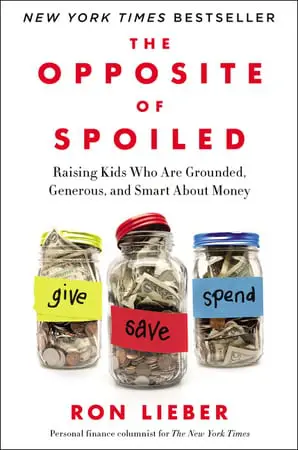Many parents find talk about salaries to be distasteful—even with our own teenagers. Bad idea, says Ron Lieber, New York Times columnist, and author of the The New York Times Bestseller, The Opposite of Spoiled: Raising Kids Who Are Grounded, Generous, and Smart About Money. Read on to find out what Lieber suggests.
Teaching Financial Responsibility Before College
Q: Why did you write the book?
Lieber: I sensed that the world was changing in a way that most of us hadn’t quite put our finger on. We’re asking our children to participate in six-figure decisions about college: where you go to college, how much you pay, and how much debt you take on. You can make a good case that this is the biggest financial decision of a teenager’s life. And they’re making it at 17, which is crazy enough. But it’s especially insane if you haven’t had much conversation about money all along. Then, four years later, our teenagers are graduating into a world where we have heaped financial responsibility—and risk—on people in a way that we did not 10, 20, 30 years ago, whether that’s the requirement to buy health insurance or the obligation to invest for your retirement.
Q: What does that mean for our teenagers?
Lieber: They need to be ready to make the right financial decisions. You can’t lose your 20s financially anymore. You just can’t, or you’ll work for the rest of your life. To me, this is an act of protection. This isn’t optional. I cannot tell you the number of stories I hear about 22- to 24-year-olds. They get their first job and rent an apartment, but don’t realize that 25 percent of their money is going to disappear to taxes. Their parents didn’t think to tell them.
Q: How can we help?
Lieber: There’s a lot you can do. For starters, you can talk with your teenager. ‘You know we want to get you ready for your life as an adult, so we’re going to start putting you in charge. We’re going to make a list of all the things you need.’ And then talk about what you’re willing to spend for each category. So maybe in our family we make a Target or Wal-Mart underwear budget, but we’re going to have a Patagonia outerwear budget. Or maybe when it comes to jeans, we don’t think you should be spending $100, so we’re going to have a Levi’s budget.
For each and every item on this list—one new winter coat, three pairs of jeans, 10 pairs of underwear, and so on—we’re going to make that budget that shows what we’re willing to pay. Then we will give you that entire lump sum, and you’ll be in charge. If you want Victoria’s Secret underwear and you’re willing to buy the coat at Goodwill or if you want just one pair of jeans that are 7 for All Mankind and cost $180 … well, that’s on you. But don’t come to us when you run out of money because this is what you get for the year.
Q: Where do you stand on allowance?
Lieber: Allowance—and money, more generally—is a tool for learning. I saw an amazing sign that said, “Practice makes progress. Not perfect.” I thought that was a great thing that applies to money because we want our kids to spend it and save it and give it away so they can learn how it works. Look, it should not go without saying that you’re privileged if you can afford to give kids allowance in the first place. But I don’t see allowance as a privilege any more than, say, books or piano lessons. It’s just something else that we do so that our teenagers can learn the things we want them to learn.
Q: Should our teenagers be working?
Lieber: Yes. Even if you don’t want them working during the school year, they should work at least one 
Q: Some parents believe that their teenager will be a more competitive college applicant if they spend summers in enrichment activities, not just working at, say, Starbucks.
Lieber: The presumption that colleges devalue work is flat-out incorrect. Colleges want you to display a passion for something. Imagine the poor admissions officer witting with 50 applications at 11:30 p.m. Eight of those applications are all the same. Kids with 5.0’s; captains of the soccer team; stars of the school play; kids who’ve done enrichment during the summer.
And over here you have two other applicants. One wrote about what it was like to work at McDonalds and all the things he learned from his colleagues there. Another wrote about what he learned when his parents got divorced, and all of a sudden the family became a “have less” as opposed to a “have more.” Which kid are you going to pick? That’s not a rhetorical question. I have asked these college admissions officers and they say, “Please, more essays about real things that matter and not all this other stuff that we constantly get.” Colleges value work, passion, and the pursuit of something important to you.
Q: But parents worry that a job will impact grades.
Lieber: We don’t have that concern about the soccer team or drama, so it’s not clear to me why everybody worries about that. And by the way, there are about a thousand studies that have looked at this and found, again and again, that as long as you don’t work more than 15 hours a week, your grades are not impacted.
Q: You recommend parents share their salary when asked.
Lieber: Many of us assume that avoiding this conversation is an act of protection. We want to keep our children innocent a little longer. But that’s naive because they’re reading this stuff online. Anyone can google house values, for example. Teens are talking with their friends, and they are curious. They’re trying to put the pieces of all this together because that’s their job. And it’s our job to help them.
Q: So what’s the conversation?
Lieber: You say, “We’ll tell you this information when you’re ready.” If they demonstrate financial responsibility with, say, allowance or a clothing budget, then when they’re 15 to 17, you do a big discretion test. Do you notice that they protect their friends’ secrets? Are they keeping their siblings’ secrets? Are they keeping family information within the family?
And if they’re doing all of that, you sit down with them and say, “We think it’s important for you to have this information, so that you know what it takes to have the life we have. This is not to say that we expect you to recreate this life for yourself. We don’t expect that of you and what we most care about is that you find something to do that makes you happy. But we do think that this is information that you should have. However, we also want you to know that this information has no value outside of this household. And if you go talking about it, you’re going to sound like a jerk.”
No kid wants to flunk the discretion test, but they definitely don’t want to flunk the jerk test, so if you put it to them that way, they’ll probably keep it to themselves.
Q: What’s your advice for parents who don’t feel confident when it comes to finances?
Lieber: You know more than you realize. If you’re a parent, you’re running a household. You’re paying bills. You have a mortgage or you’re paying rent. You’re buying groceries. All this stuff is happening. Even if you’re not doing it so well, there’s nothing like knowing that you are setting an example for your children to shake yourself up.




